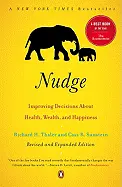
Nudge - by Richard Thaler and Cass Sunstein
ISBN: 014311526XDate read: 2010-08-15
How strongly I recommend it: 5/10
(See my list of 360+ books, for more.)
Go to the Amazon page for details and reviews.
Introducing the idea of Libertarian Paternalism: influencing people's behavior for their own benefit, without forbidding any options or significantly changing their economic incentives.
my notes
Libertarian paternalists want to make it easy for people to go their own way; they do not want to burden those who want to exercise their freedom. The paternalistic aspect lies in the claim that it is legitimate for choice architects to try to influence people's behavior in order to make their lives longer, healthier, and better. In other words, we argue for self-conscious efforts, by institutions in the private sector and also by government, to steer people's choices in directions that will improve their influence choices in a way that will make choosers better off, as judged by themselves.
Individuals make pretty bad decisions - decisions they would not have made if they had paid full attention and possessed complete information, unlimited cognitive abilities, and complete self-control.
Choices are not blocked, fenced off, or significantly burdened.
A nudge, as we will use the term, is any aspect of the choice architecture that alters people's behavior in a predictable way without forbidding any options or significantly changing their economic incentives. To count as a mere nudge, the intervention must be easy and cheap to avoid. Nudges are not mandates. Putting the fruit at eye level counts as a nudge. Banning junk food does not.
Availability heuristic: They assess the likelihood of risks by asking how readily examples come to mind. If people can easily think of relevant examples, they are far more likely to be frightened and concerned than if they cannot.
Biased assessments of risk can perversely influence how we prepare for and respond to crises, business choices, and the political process.
Governments are likely to allocate their resources in a way that fits with people's fears rather than in response to the most likely danger.
The "hot-cold empathy gap." When in a cold state, we do not appreciate how much our desires and our behavior will be altered when we are "under the influence" of arousal.
Ties were originally used as napkins.
Parents should worry less about which college their kids go to and more about which roommate they get.
Consistent and unwavering people, in the private or public sector, can move groups and practices in their preferred direction.
Collective Conservatism: the tendency of groups to stick to established patterns even as new needs arise. Once a practice (like wearing ties) has become established, it is likely to be perpetuated, even if there is no particular basis for it. Sometimes a tradition can last for a long time, and receive support or at least acquiescence from large numbers of people, even though it was originally the product of a small nudge from a few people or perhaps even one. Of course, a group will shift if it can be shown that the practice is causingserious problems. But if there is uncertainty on that question, people might well continue doing what they have always done.
Merely because we think that most other people like it. Many social practices persist for this reason, and a small shock, or nudge, can dislodge them.
People are paying less attention to you than you believe. If you have a stain on your shirt, don't worry, they probably won't notice. But in part because people do think that everyone has their eyes fixed on them, they conform to what they think people expect.
Those who eat with one other person eat about 35 percent more than they do when they are alone; members of a group of four eat about 75 percent more; those in groups of seven or more eat 96 percent more.
When people are asked what they intend to do, they become more likely to act in accordance with their answers.
40,000 people asked a simple question: Do you intend to buy a new car in the next six months? The very question increased purchase rates by 35 percent.
People will need nudges for decisions that are difficult and rare, for which they do not get prompt feedback, and when they have trouble translating aspects of the situation into terms that they can easily understand.
For all their virtues, markets often give companies a strong incentive to cater to (and profit from) human frailties, rather than to try to eradicate them or to minimize their effects.
Self-control issues are most likely to arise when choices and their consequences are separated in time. At one extreme are what might be called investment goods, such as exercise, flossing, and dieting. For these goods the costs are borne immediately, but the benefits are delayed. For investment goods, most people err on the side of doing too little.
At the other extreme are what might be called sinful goods: smoking, alcohol, and jumbo chocolate doughnuts are in this category. We get the pleasure now and suffer the consequences later.
The benefit of having so little choice is that the chef is authorized to cook you things you would never have thought to order.
If consumers have a less than fully rational belief, firms often have more incentive to cater to that belief than to eradicate it.